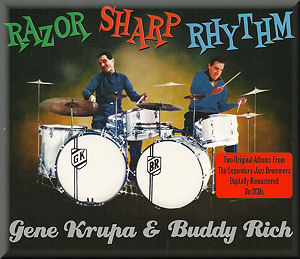CD1
1. Buddy's Blues
2. Bernie's Tune
3. Gene's Blues
4. Sweethearts On Parade
5. I Never Knew
Gene Krupa - Drums
Buddy Rich - Drums
Oscar Peterson - Piano
Herb Ellis - Guitar
Ray Brown - Double bass
Roy Eldridge, Dizzy Gillespie - Trumpets
Illinois Jacquet - Tenor sax
Flip Phillips - Tenor sax, clarinet
CD2
1. Jumpin' At The Woodside
2. It Don't Mean A Thing (If It Ain't Got That Swing)
3. Duet
4. Night Train
5. King Porter Stomp
6. Perdido
7. Evolution
8. Hawaiian War Chant
Gene Krupa - Drums
Buddy Rich - Drums
Don Goldie, Al Stewart, Nick Travis, Joe Wilder - trumpets
Jimmy Cleveland, Frank Rehak - Trombones
Danny Bank, Sam Marowitz, Jerry Sanfino, Eddie Wasserman - Reeds
John Bunch - Piano
George Barnes, Howard Collins - Guitars
Herman "Trigger" Alpert - Bass
I can welcome this reissue of two CDs in one package because it contains one of my all-time favourite tracks. It is the first track on the first CD, which was recorded in 1955 under the aegis of Norman Granz and released as Krupa and Rich. The second LP was recorded in 1962 (produced by Creed Taylor) and issued with the title Burnin' Beat. Both albums feature drummers Gene Krupa and Buddy Rich - either competing or collaborating.
Buddy's Blues is one of my favourite recordings because it swings like mad - driven along not only by Buddy Rich's drums but also the starry rhythm section of Peterson, Ellis and Brown. They are joined by four fantastic musicians, who each get to solo after drum breaks which increase the temperature. The swing is assisted by the front-line soloists, who help the general forward movement. And Buddy's solo is impeccable.
There can be little doubt that Buddy Rich's drum technique is better than Gene Krupa's, even though all drummers owe Krupa a debt for the way he put the drums in the limelight (and Krupa always came across as a more amiable man than Rich). The contrast between the two is underlined by Gene's Blues, which moves forward less smoothly than Buddy's Blues. Gene's breaks between the instrumental solos are less assured than Buddy's.
The two drummers come together for Bernie's Tune, swapping solos for more than six minutes before the band comes in rather raggedly. Eventually the two tenor saxes and then the two trumpets compete rather as the drummers had done earlier. Sweethearts on Parade is more restrained - and all the better for it, with Oscar Peterson's educated piano stating the theme and the horn men playing elegant solos. Dizzy Gillespie doubles the tempo halfway through his solo.
I Never Knew starts with a nicely-arranged riff on the melody before Peterson comes in with something nearer the tune. Ray Brown's faultless bass adds to the subtly swinging effect. The sleeve-note omits to tell us which drummer is playing on which of these last two tracks, but it sounds like Rich on 4 and Krupa on 5.
The second LP, Burnin' Beat, used a big band to back the two drummers, although this was hardly necessary, as much of the album is taken up with drum solos - and the band tends to make the sound fuzzy rather than biting. Gene Krupa's drums are more loosely braced than Buddy's, making them sound less precise. In fact Duet consists simply of the two drummers in friendly (?) competition. Night Train is a bit of a mess but King Porter Stomp works better, separating the drummers clearly.
Whoever thought of turning Perdido into a cha-cha deserves to be shot. Evolution seems to trace the history of drumming from the jungle (lotsa tomtoms) via marching bands and Dixieland to swing and beyond. It's a good idea but the joins between each section are badly co-ordinated. The session ends with Hawaiian War Chant (more tomtoms), with both drummers depending heavily on single-stroke rolls. An unidentified voice closes the album with "That's all, folks!"
These two albums suggest that putting drummers in competition with one another is not necessarily a good idea, and that most bands are better with one drummer instead of two. Yet drummers will still enjoy comparing the styles of Krupa and Rich.
Tony Augarde
www.augardebooks.co.uk
